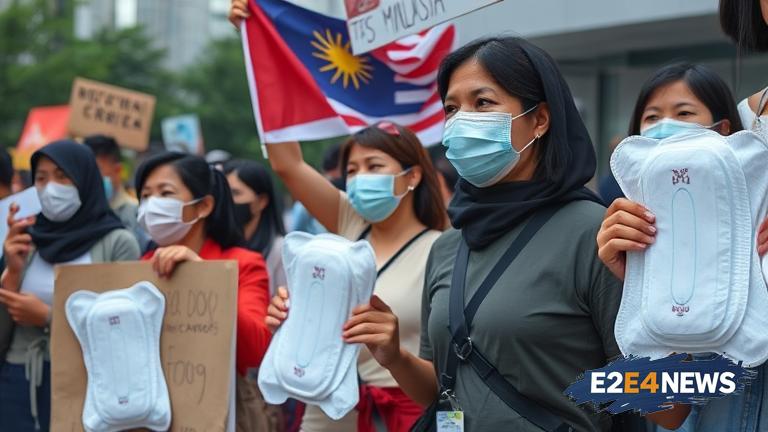A recent protest in Malaysia has brought attention to the issue of sanitary pad prices, with many women speaking out about the financial burden of purchasing these essential products. The protest, which was sparked by a social media campaign, has highlighted the need for greater awareness and understanding of women’s health and hygiene needs. In Malaysia, sanitary pads are subject to a 10% sales tax, which many argue is unfair and discriminatory. The tax, which was introduced in 2015, has been criticized for disproportionately affecting low-income women who may struggle to afford these essential products. The protest has also sparked a national conversation about women’s rights and gender equality, with many calling for an end to ‘deeply regressive’ policies that perpetuate inequality. Women’s rights activists have long argued that the tax on sanitary pads is a form of gender-based discrimination, and that it perpetuates the notion that women’s health and hygiene needs are not a priority. The Malaysian government has been criticized for its handling of the issue, with many arguing that it has failed to adequately address the concerns of women and girls. The protest has also highlighted the need for greater education and awareness about women’s health and hygiene needs, particularly in rural and disadvantaged communities. In these communities, access to sanitary pads and other essential products may be limited, and women may be forced to rely on makeshift or unhygienic alternatives. The use of makeshift or unhygienic alternatives can have serious health consequences, including infections and other health problems. The protest has sparked a national conversation about the need for greater investment in women’s health and hygiene, particularly in rural and disadvantaged communities. Many are calling for the government to remove the tax on sanitary pads and to increase funding for women’s health and hygiene programs. The issue has also sparked a conversation about the role of men in promoting women’s rights and gender equality. Many men have spoken out in support of the protest, arguing that it is essential to recognize the importance of women’s health and hygiene needs. The protest has also highlighted the need for greater awareness and understanding of the impact of ‘deeply regressive’ policies on women and girls. These policies, which perpetuate inequality and discrimination, can have serious consequences for women’s health, education, and economic empowerment. The Malaysian government has been criticized for its failure to address these issues, and for perpetuating policies that perpetuate inequality. The protest has sparked a national conversation about the need for greater accountability and transparency in government policies and programs. Many are calling for the government to be more responsive to the needs of women and girls, and to prioritize their health, education, and economic empowerment. The issue has also sparked a conversation about the role of social media in promoting women’s rights and gender equality. Social media has played a key role in raising awareness about the issue and in mobilizing support for the protest. The protest has highlighted the need for greater awareness and understanding of the impact of social media on social movements and activism. The use of social media has enabled women and girls to connect with each other and to mobilize support for their cause. The protest has also sparked a conversation about the need for greater investment in women’s health and hygiene, particularly in rural and disadvantaged communities. Many are calling for the government to increase funding for women’s health and hygiene programs, and to prioritize the needs of women and girls. The issue has also sparked a conversation about the role of education in promoting women’s rights and gender equality. Education is essential for promoting awareness and understanding of women’s health and hygiene needs, and for empowering women and girls to make informed decisions about their health and well-being.





